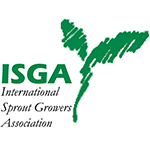28th Annual ISGA Convention – April 23 – 27, 2018
Cape Cod, Massachusetts, USA
Convention Theme: Sprout Evolution
The next generation of the sprout industry is evolving through collaboration of members of the sprout industry within each country and on the international stage.
Speaker Biographies:
Click HERE for biographies.
Convention Presentations:
Below are general descriptions of presentations, most with a link to the full presentation. For quick reference, a general category in parentheses is included at the bottom of each presentation description.
Bob Sanderson’s Presentation Notes
Bob Sanderson is Chair of the Science Committee.
Bob Sanderson points out the ambiguity of scientific conclusions using examples of seed sanitation testing for pathogens in the early 2000’s.
Click HERE for the full presentation.
(Sprout Safety)
A Restaurant’s Experience with Buying Local by Brittany Sperber,
Community Engagement Manager
The advantages and challenges restaurants face when buying local produce.
Click HERE for the full presentation.
(Food sources and distribution)
Collaboration
Outline for a panel discussion about working together to make sprouts a primary food group and strong sector. Discussion topics included bio controls to enhance sprout safety, maintaining seed diversity and the role of ISGA as an agent of collaboration.
Click HERE for the full outline.
(The Sprout Industry)
The Sprout Microbiome by Cara Haney and Sarzana Hossain,
Dept. of Microbiology and Immunology / Michael Smith Laboratories
This is a well-illustrated presentation using maps, diagrams and pictures to explain the role of microbes in plant and human health and the use of genomics to identify genes that affect systemic defenses. The first part of this presentation provides the science behind Phase 1 of an on-going study. Its aims are to develop procedures for scaling sprout production to the lab, to find evidence that the endogenous microbiome protects sprouts from human pathogens and to identify microbes that can give protection from human pathogens.
Details about “Phase 2: Genome British Columbia 2018, Sector Innovation Proposal” are provided. Phase 2 is currently in review.
(Sprout Safety)
NOTE: This presentation is 80 megs in size and will not fit within WordPress. Contact the ISGA Office for a copy.
converTsations – The art of sharing what you love by Karden Rabin
This presentation starts with the question “What do you do?” The different responses illustrate the do’s and don’t of how to respond. “Speak to the Listening of your Customers” leads to a discussion of ways to ingratiate yourself with your customers. A discussion of product presentation cites examples of “hot products” that once were not. Example: Kale (“formerly known as garnish and deli case décor”).
Click HERE for the full presentation.
(Marketing)
Organic Sprouting Seed: Current Issues by Lisa Mumm
Growers of organic products are concerned with the consequences of new genetic engineering techniques which can limit bio diversity. One such technique is Gene Drive which can modify specific populations and even entire species. GMO contamination of organic seeds and plants are also a big problem. However, organic growers must meet the expectations of their customers. Innovations in organic breeding were also part of this presentation: participatory breeding, organic methods for increasing seed production, intercropping and soil building.
Click HERE for the full presentation.
(Organic Seed Production)
Crop Wild Relatives: conservation needs, potential for climate resilient agriculture and tools for evolutionary ecology by Eric JB von Wettberg, University of Vermont
Ethiopia’s drought and famine are used as an example of what will happen in the future as the climate continues to change if more climate resilient crops and crop wild diversity are not pursued. Multi-institutional and multi-national initiatives to build crop wild collections are noted. There is detailed information about breeding strategy and the challenges ahead.
(Bio Diversity)
NOTE: This presentation is more than 100 megs in size and will not fit within WordPress. Contact the ISGA Office for a copy via email.
Pathogen reduction on mung bean reduction of Escherichia coli O157:H7, Salmonella enterica and Listeria monocytogenes on mung bean using combined thermal and chemical treatments with acetic acid and hydrogen peroxide
Monika Trzaskowska, Yue Dai, Pascal Delaquis, Siyun Wang
Presented by Siyun Wang
This study has been finalized but is not open-access and is therefore unavailable online. It is particularly useful for organic sprouters as the treatments meet organic standards. If you would like to obtain a copy of this study, contact the ISGA Office.
(sprout sanitation)

